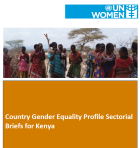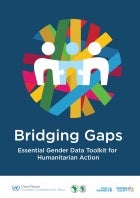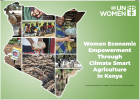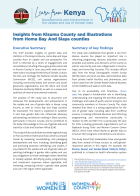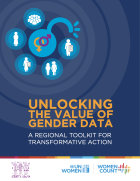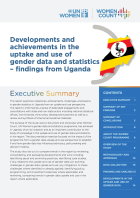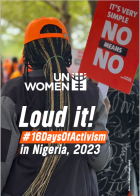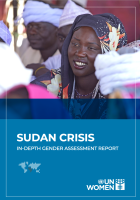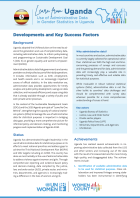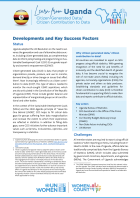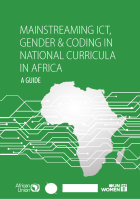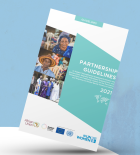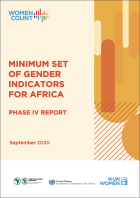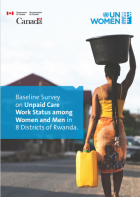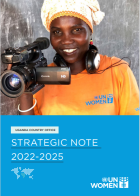1 - 20 of 37 Results
Pagination
Date:
These policy briefs, form part of the Country Gender Equality Profile (CGEP), evaluates gender equality in Kenya, offering evidence-based insights for stakeholders to advance commitments to Gender Equality and Women’s Empowerment (GEWE). Guided by the EU Gender Action Plan 2021–2025, they promote inclusive, transformative approaches to inform programmes, policies, and actions, addressing diverse gender needs and advancing Kenya’s Sustainable Development Goals (SDGs) through national and county-level collaboration.
Date:
This toolkit is aimed at providing an easily accessible compendium of resources available for the production and use of gender data in humanitarian settings. It is tailored to build capacity and provide guidance to governments, civil society organizations (CSO), humanitarians working with data, information managers, managers, decision makers, statisticians, and users of gender statistics. The contained tools can be used in support of key humanitarian planning and operational processes, including advocacy, strategy and policy formulation, planning, resource allocation, monitoring, and evaluation.
Date:
Ethiopia has demonstrated thought leadership in the use of gender data to meet national priorities and address gaps to achieve these as well as SDG targets on gender equality and women’s empowerment (GEWE) and others. Gender data has notably been used to improve and safeguard education opportunities for girls, boost agriculture and productivity, particularly for female-headed households including through addressing land ownership, and to address issues of gender-biased violence.
Date:
The WEE-CSA Storybook showcases the success stories of over 2,400 women from Kitui, Laikipia, and West Pokot who have transformed their lives through climate-smart agriculture. Funded by KOICA and implemented by UN Women Kenya, it highlights the project's impact on livelihoods and gender equality while sharing valuable lessons learned. This collection celebrates resilience and aims to inspire further community upliftment for sustainable development in Kenya.
Date:
Kenya has demonstrated thought leadership in the use of administrative and citizen data for statistical purposes and harnessing official data to meet national priorities and SDG targets including on gender equality and women’s empowerment. This product highlights tangible achievements and lessons in improving access to and use of this data to influence policy and decision-making and improve the lives of women and girls in Kenya.
Date:
This Toolkit is designed to support the enhanced use of existing gender data and statistics in policy, advocacy, planning, and accountability in East and Southern Africa. The production and use of gender statistics is a complex process that requires deliberate efforts to connect, incentivize, and influence.The strategies outlined provide guidance and user-friendly tips on how to influence, direct, and monitor the pace of progress towards achieving gender equality and women’s economic empowerment and using gender data and statistics.
Date:
This product is related to the Be Like Tanzania series and part of an ongoing regional study. The study aims to showcase developments, achievements and lessons in the uptake and use of gender data and statistics in East and Southern Africa as part of experience-sharing and particularly south-south learning towards promoting the communication and use of gender data and statistics for policy- and decision-making to improve the lives of women and girls.
Date:
Uganda has demonstrated thought leadership in the use of administrative and citizen data for statistical purposes in its efforts to meet national priorities and address gaps towards achieving the Third National Development Plan (NDPIII) and SDG targets including on gender equality and women’s empowerment. This product highlights some of the achievements and lessons in improving the quality and use of this data to improve the lives of women and girls.
Date:
This Regional Coordination Strategy articulates how UN Women will leverage its unique triple mandate—encompassing normative support, UN system coordination, and operational activities—to mobilize urgent and sustained action to achieve gender equality and the empowerment of all women and girls and support the achievement of the 2030 Agenda.
Date:
This document gives an overview of the activities carried out during the 16 Days of activism 2023 Campaign in Nigeria.
Date:
The assessment utilized the gender inequality framework used in humanitarian settings. The framework considered how the gender inequalities prevalent in pre-conflict contexts are exacerbated by conflict dynamics and how the impact differs with different gender roles. The framework indicates that the humanitarian responses should consider the basic livelihood needs and investigate and address some strategic issues that promote
Date:
This Policy Brief will explore the results of the mapping of the women’s movement, and the weaknesses, strengths and recommendations of the current civil-society movement as identified during the National Forum and analysis of the mapping.
Date:
Uganda has demonstrated thought leadership in the use of administrative data for statistical purposes in its efforts to meet national priorities and address gaps to achieve the Third National Development Plan (NDPIII) and SDG targets including on gender equality and women’s empowerment. This brief highlights some of Uganda’s achievements and lessons in improving the quality and use of this data to address violence against women and girls (VAWG).
Date:
Uganda's the national statistical system (NSS) has sought to respond effectively to the surge in demand for gender data by using existing legal infrastructure, coordination mechanisms, and statistical and data development strategies to increase the available data. One of these steps is the development of citizen-generated data (CGD)−now more accurately referred to as citizen contribution to data (CCD). Several achievements and lessons from this move are highlighted in this brief.
Date:
The Guide "Mainstreaming ICT, Gender & Coding In National Curricula In Africa Guide" provides strategies designed to systemically mainstream gender, coding and ICT into national curricula across Africa. The Guide will serve as a starting point for education ministries, educational stakeholders and leadership teams looking to understand the best ways to go about integrating computing and gender into the national curriculum of secondary education.
Date:
UN Women, through the Spotlight Initiative Africa Regional Program (SIARP), in collaboration with the AUC and in partnership with the EU Delegation to the AU, launched the “Partnership Guidelines to Support Engagement between the African Union and Traditional and Regional Leaders” with key recommendations to respond to Gender-Based Violence in the continent.
Date:
The purpose of the Global Minimum Set of Gender Indicators is to develop a common statistical measurement framework that could be used for the national production and international compilation of gender statistics and to track progress across countries and regions.
Date:
The baseline survey on unpaid care work status among women and men in eight districts of Rwanda seeks to understand the care-related dynamics in households, this study utilized both quantitative and qualitative research methodologies. Drawing on Oxfam’s Household Care Survey (HCS) and the Harvard Analytical Framework (also referred to as the Gender Roles Framework). The survey helps to understand how women, men and children spend their time, how care activities are distributed in the household and the access that households have to basic public services and infrastructure that facilitate their everyday survival. The study also explored the social norms that shape power relations and gender division of care labor.
Date:
Uganda has made gains in its socio-economic transformation, maintained peace and stability for over 3-decades and is on course to become an upper middle-income country by 2040. The Government of Uganda (GoU) is committed to the SDG 2030 Agenda as exemplified by the gross domestic product which doubled over the last 10-years, from $17.2 billion in 2010 to $34.4 billion in 2019. Literacy rates improved from 70% between 2012-2013 to 74% between 2016-2017, yet still literacy levels were higher for males than females. Uganda’s National Development Plan (NDP) III focuses on inclusive growth, human wellbeing and resilience, transformational and inclusive governance positions. The NDPIII is a convergence framework for the entire UN System to coherently contribute to the advancement of Gender Equality and Women’s Empowerment (GEWE) in Uganda with UN Women as a strategic partner on the path to transformation
Date:
UN Women amplified women’s role in the COVID-19 response highlighting the significant leadership roles women played in leading the response efforts in materials on COVID-19 prevention disseminated in local languages and hand washing facilities were constructed in 6 elementary schools. 528 returnee migrant women workers from the Middle East and domestic workers across Addis Ababa have been provided with basic sanitation and hygiene training and raising awareness on the disproportionate impact of COVID-19 on women, girls, and vulnerable and marginalized groups.

